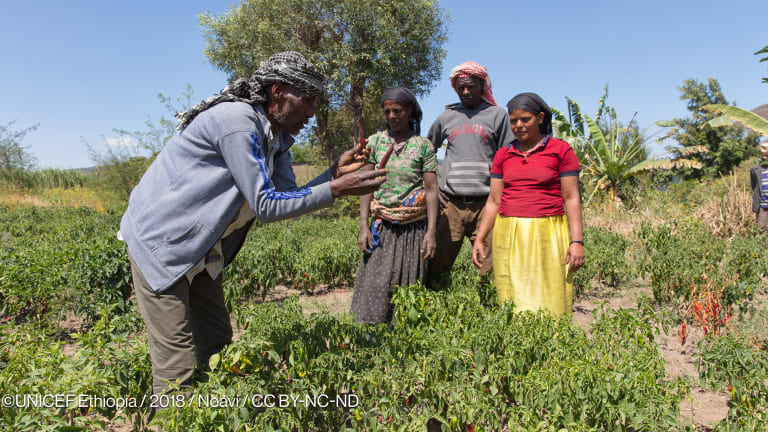
The most visible and tangible signs of climate change tend to be above water, from parched land and burning forests to failed harvests.
Get the inside track on how agriculture, nutrition, sustainability, and more are intersecting to remake the global food system in this weekly newsletter.
Yet climate change is also having a significant impact on life below the surface, leading to rising temperatures, ocean acidification, and the migration of fish in search of optimal conditions.
Nevertheless, the fruits of the sea, as well as freshwater and coastal ecosystems, offer untapped and underappreciated potential to allow those most impacted by climate change to contend with increasingly extreme conditions.
Scientific understanding of the role of fishing and aquaculture for food, nutrition, and economic security has never been greater. But translating this into practical solutions requires attention, investment, and resources from governments and policymakers, for which time is running short.
To date, climate negotiators have placed a disproportionate emphasis on land-based systems, with little to no mention of aquatic foods in national climate strategies.
However, for small island developing states and coastal countries such as Bangladesh, where fish production accounts for almost a quarter of agricultural gross domestic product, effective climate action must also harness the opportunities within aquatic food systems.
By 2100, aquatic food production in all countries is expected to face high levels of climate threat, with a disproportionate impact felt by the world’s low-income countries.
—For example, equipping small-scale fishers and aquaculture operations with the tools and technologies to identify evolving and unexpected climate hazards can enhance their ability to make a living despite the challenges associated with rising temperatures.
Fish farmers may have historically been able to mitigate predictable climate variabilities, but with climate change, the frequency and intensity of extreme weather events will increasingly become unpredictable.
It is clear that many fish farmers remain unaware of how climate change is impacting key factors that determine their livelihoods, such as water quality, fish feeding, and reproduction — and few understand how to navigate these consequences, according to a study conducted in Bangladesh.
Providing fundamental climate information services along with training can be the difference between a farmer knowing when to increase water supply to their fish ponds during an unexpected or prolonged dry spell and one who loses their fish stocks — and with them, their income and food supplies.
Investing in ways to ensure fish farmers can maintain their livelihoods as new climatic conditions unfold also reduces the pressure on other, more climate-vulnerable or risky alternatives such as crop production.
Farming systems that integrate both rice and fish, for example, mean smallholder families have more than one source of income and food if a rice harvest fails, while the enormous diversity of aquatic foods also generates a range of new income opportunities.
Seaweed farming is becoming an increasingly lucrative alternative to fish, with some 200 species identified, 10 of which are commercially important in Bangladesh alone.
Although often labor-intensive, coastal seaweed farming requires fewer outlays, which makes it viable for resource-poor or vulnerable people including women and youth, with early research finding that seaweed farmers can earn up to $11 for every $1 invested.
Transitioning to healthy and sustainable diets, such as those that incorporate seaweed and other aquatic plants, also reduces the climate risks posed to food security. Despite the historic and continued significance of aquatic foods in both mitigation and adaptation to climate change, there is very little attention given to the sector both from policymakers and investors.
Small fish, shellfish, and seaweeds, in particular, have enormous nutritional value with a lower environmental footprint than land-based animals, but families need greater support to maximize yields and nutritional returns in a way that also minimizes the resources needed for food production.
Sustainable management of aquatic animals and plants means stored carbon dioxide that would have otherwise been released to the atmosphere. A recent study found that fishes help remove 1.65 billion tons of carbon from the atmosphere. Leaving more fish in the sea, through sustainable management and restoration of depleted fish stocks can play a significant role in the fight against climate change — delivering a triple win for nature, people, and climate.
Incorporating more aquatic foods into national diets and dietary guidelines helps to climate-proof food and nutrition while also establishing consistent demand that supports the livelihoods of small-scale fishers.
By 2100, aquatic food production in all countries is expected to face high levels of climate threat, with a disproportionate impact felt by the world’s low-income countries. At the same time, the global population is expected to surpass 11 billion, many of whom will rely on aquatic foods for their income and nutrition.
Despite this, climate strategies or nationally determined contributions are missing the mechanisms and investment that will allow the world’s most vulnerable to adapt, and thrive through fishing and aquaculture.
It is high time for governments to take a deep dive into the opportunities offered by aquatic food systems for greater resilience to the uncertainties and challenges that lie on the horizon.









